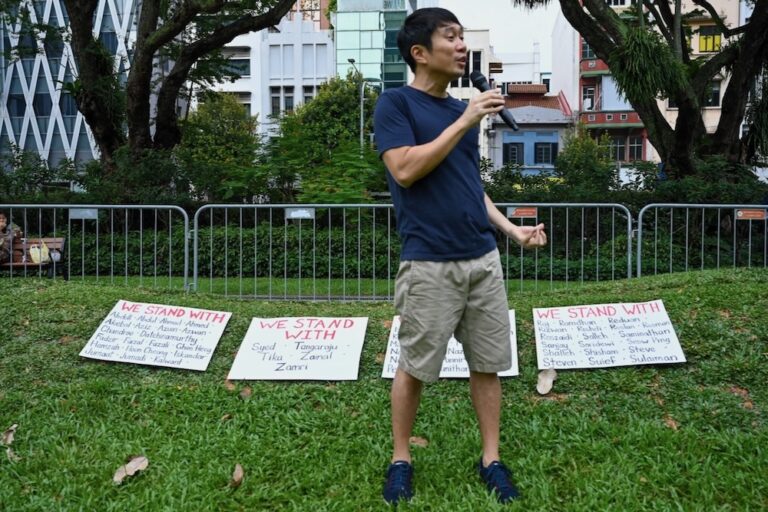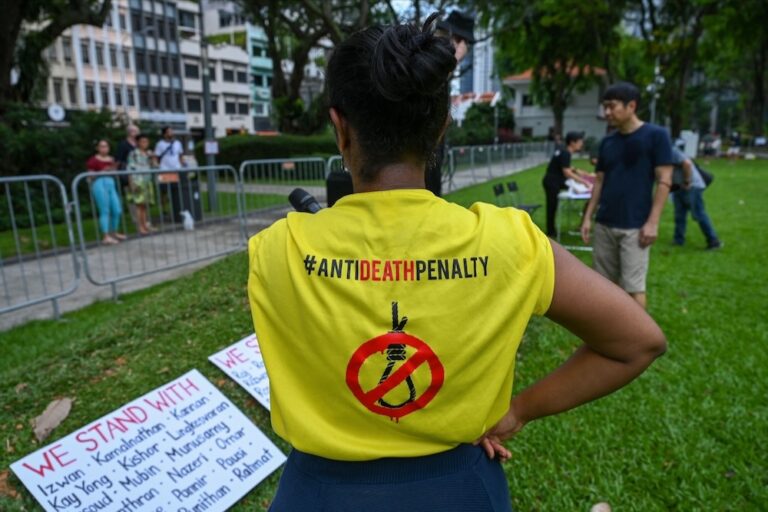(CPJ/IFEX) – The following is a 5 May 2005 CPJ press release: SINGAPORE: Web log shuts down after government threat of legal action New York, May 5, 2005 – The threat of legal action has prompted Singaporean blogger Jiahao Chen to shut down his site and post an apology for comments criticizing a government agency […]
(CPJ/IFEX) – The following is a 5 May 2005 CPJ press release:
SINGAPORE: Web log shuts down after government threat of legal action
New York, May 5, 2005 – The threat of legal action has prompted Singaporean blogger Jiahao Chen to shut down his site and post an apology for comments criticizing a government agency and its chairman. The Committee to Protect Journalists said today it is alarmed that the threat of defamation lawsuits is being used to inhibit criticism of the government in cyberspace, much as it has in Singapore’s traditional media.
A*Star (Agency for Science, Technology and Research) acknowledged that it threatened to lodge a defamation suit against Chen, Channel NewsAsia reported yesterday. Chen, who is currently pursuing graduate studies in the United States, was formerly a scholarship student through the agency. Under the pseudonym Acid Flask, he posted comments on his Web log criticizing the agency’s policies, according to other Internet news sources.
On April 26, Chen shut down his site and posted a statement that “the price of maintaining the content . . . has become too high for the author to afford.” He apologized to A*Star and to its chairman, Philip Yeo, “for having hosted or made remarks which Mr. Yeo felt were defamatory to him and the agency that he leads,” and promised not to mention the chairman or the agency by name on the Web site.
Government agencies and officials in Singapore have often lodged civil and criminal defamation complaints – which can bring large fines and jail time – against traditional media outlets that criticize them by name. The London-based Economist magazine paid US$230,000 in damages to Prime Minister Lee Hsien Loong and his father last year after noting a “whiff of nepotism” in the appointment of the prime minister’s wife as chief of a government investment company.
Bloggers who criticize Singapore’s political or social policy often do so anonymously. Following the threat of legal action against Chen, lawyer Gilbert Koh shut down his Web log. Koh wrote that he had not received any threat of legal action, but that he could not risk a defamation suit by writing under his real name. In his last posting, he offered tips to other bloggers to avoid defamation complaints by remaining anonymous, refraining from naming officials or agencies in their criticism, and removing remarks posted by others that might be construed as defamatory.
“Defamation suits are used as a club by the government of Singapore to silence critical thinking and reporting in the media,” CPJ Executive Director Ann Cooper said. “We are troubled that the government has raised the specter of costly legal action to chill commentary on the Internet.”
CPJ is a New York-based, independent, nonprofit organization that works to safeguard press freedom worldwide. For more information about press conditions in Singapore, visit http://www.cpj.org


